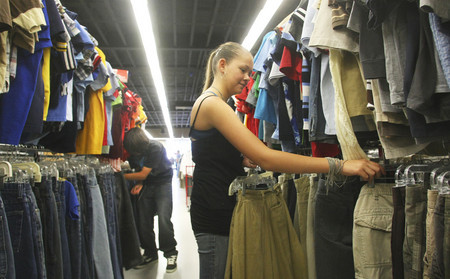Stimulus pays for summer jobs

By JAMES HAUG
Hoover Dam was the great public works project of the 1930s.
A summer work program for the greatest recession since the Great Depression had teens touring a museum exhibit of the dam at the Springs Preserve.
As they did in the 1930s, conservative critics today question the effectiveness of government stimulus programs, but teens in the Green Academy of Training and Technology say their pay will go straight back into the economy.
“It would be nice to have a car for my senior year,” said Jermaine Mitchell, 16, a student at Chaparral High School. “According to my grandmother, I have to pay for it myself.”
Diego Ruvalcaba, 15, a sophomore at Arbor View High School, said, “I want to help my family financially.”
Upon completion of the 51/2-week program, they will each be paid $1,000 through the American Recovery and Reinvestment Act.
Erin Cornelius, director of the Big Brothers Big Sisters of Southern Nevada, which organized the Green Academy, said many students’ families will depend on the $1,000 checks for necessities such as food and shelter.
Cornelius knows of three jobs the federal stimulus has saved. Without the Green Academy, Big Brothers Big Sisters would have to reduce employee hours or lay off three employees for the summer.
Big Brothers Big Sisters designed its Green Academy to be in tune with President Barack Obama’s goal of revitalizing the economy through an investment in renewable energy and eco-friendly industry.
“We have to prepare the work force for the jobs of the future,” Cornelius said.
The 50 teens in the Green Academy of Training and Technology are learning about conservation and the environment. They are also cleaning up litter on Mount Charleston, helping businesses to recycle, and installing solar equipment for a retirement center.
The Green Academy is just one of 22 youth summer programs to be funded with $3.2 million from the federal stimulus in Southern Nevada.
Jobs are hard to find this summer. Because of the recession, adults are taking many jobs that would normally be filled by teens, noted Kelly Henwood, the youth program director for Workforce Connections, formerly known as the Southern Nevada Workforce Investment Board.
The 1,351 teens who are benefiting from the programs are some of the area’s neediest. To qualify for these programs, they must be economically disadvantaged and have some barriers to employment, such as being a foster child, a teen parent or lack basic skills.
Southern Nevada Children First, for example, is paying 20 homeless and/or pregnant teens $7.50 an hour to work 20 hours a week in clothing stores, offices and child care centers.
“A lot of them live on the streets or in shelters,” said Monique Harris, the program’s director.
If the youth did not have something to do, many would “be on the street this summer,” Cornelius said.
Louise Helton of Communities in Schools said these summer programs have been a “godsend for families.”
Her organization is using federal funds to pay for summer school for 124 students, plus six weeks of employment through Manpower, the temporary employment agency.
Manpower will be getting federal funds to pay the youths $7.25 an hour for eight-hour-a-day jobs, Helton said.
“These are good first jobs with training wheels,” she said. “The hard part about being young is that no one wants to hire you because you have no experience. This breaks that cycle.”
Dan Ward, the director of training and development for Manpower of Southern Nevada, said it’s “great for employers because they get some extra work done without having to pay for it.”
Ward said he hopes some teens might be able to keep their jobs after the program is over.
Manpower has teens performing clerical work for the Metropolitan Police Department, maintenance for the Clark County School District and merchandise sales at a kiosk for the Las Vegas Chamber of Commerce.
Dan Mitchell, a fellow at the Cato Institute, a libertarian think tank in Washington, D.C., was skeptical of government-funded “make work.”
“It’s not a good use of taxpayer money,” Mitchell said. “It’s not stimulating the economy.”
Mitchell said the government funding is a diversion from the private sector, which could have used the same money to create “real jobs” for teens instead of government “goof-off jobs.”
Chuck Muth, president of Citizens Outreach, a libertarian group, said paying kids to pick up trash at Mount Charleston might sound or feel good, but that should not be the function of federal spending. He said there are more “legitimate functions” for federal money, like paying for national defense.
Andy Matthews, vice president of communications for the Nevada Policy Research Institute, a conservative think tank that advocates “private solutions” to public policy issues, said government should not be in the position of favoring one group or cause over another with government contracts. He said government was usurping the role of the free market by picking and choosing which summer youth programs to fund.
Cornelius of Big Brothers Big Sisters said these programs are necessary because of the scarcity of jobs this summer.
The summer programs are designed to expose students to different career opportunities and give them the soft skills needed for getting and keeping a job, such as proper attire, punctuality and teamwork.
Because federal money is involved, Cornelius said there is “lot of oversight, paperwork,” so much so that it can be overwhelming.
An official from the U.S. Department of Labor is inspecting the program.
Contact reporter James Haug at jhaug@reviewjournal.com or 702-374-7917.